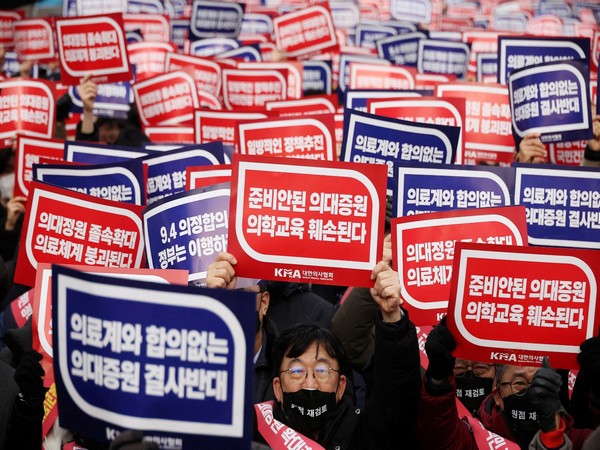
Seoul: Seoul witnessed a significant protest on Sunday as thousands of doctors took to the streets to voice their opposition to the South Korean government's proposal to increase medical school admissions, CNN reported.
The demonstration also highlighted broader concerns regarding insufficient support for the nation's healthcare system.
The protesting doctors said that the government should address a spectrum of challenges facing the healthcare system rather than merely increasing the annual intake of medical students. Key concerns include specific field staffing, government remuneration for essential medical treatments, and the establishment of a robust infrastructure to support the education of a growing number of medical students, according to CNN.
The government's announcement in February revealed plans to boost medical school admissions by 2,000 students annually, starting from the 2025 academic year, ultimately reaching a total of 5,000 students per year. The objective is to meet the evolving healthcare demands of one of the world's fastest-ageing societies and enhance medical accessibility in rural areas.
Trainee doctors, facing difficult working conditions marked by low pay and long hours, commenced strikes on February 21, with around 8,000 submitting their resignations. An additional 1,000 have resigned since then, reflecting the gravity of the situation.
South Korean President Yoon Suk Yeol emphasized the government's commitment to the proposed changes, stating, "Protecting people such as children, the elderly, and people with disabilities is directly linked to the government's core policy on welfare for the vulnerable populations in healthcare. Therefore, this [medical reform] is not a matter for negotiations or compromise."
According to a recent Gallup poll, 76 per cent of respondents favoured expanding medical school admissions.
On Thursday, the government issued a back-to-work order, warning striking doctors their medical licenses could be suspended if they did not comply.
Despite the deadline, a representative for South Korea's doctors said they supported the walkout and would continue to push for their demands to be met.
To address the healthcare gap during the strike, the government has enlisted and granted legal protection to nurses for performing certain medical procedures typically handled by doctors, according to the health ministry.
The standoff between the government and the medical community underscores the complexity of balancing healthcare demands in a nation experiencing a shrinking number of child care facilities, a surge in elderly facilities, and the world's lowest birth rate since 2015, CNN reported.